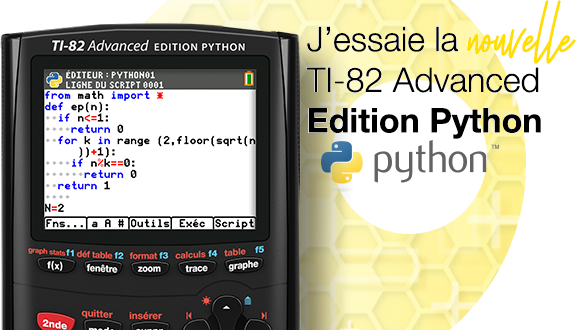
 Dans un article précédent nous découvrions l'entrée série du TI-Nspire Navigator Access Point, le point d'accès permettant la création de réseaux de calculatrices TI-Nspire sans fil en classe.
Dans un article précédent nous découvrions l'entrée série du TI-Nspire Navigator Access Point, le point d'accès permettant la création de réseaux de calculatrices TI-Nspire sans fil en classe.Nous réussissions à en tirer profit pour accéder à la console U-Boot en transmettant n'importe quel caractère au moment où le log de démarrage nous y invitait :
- Code: Select all
Texas Instruments X-Loader 1.4.4ss (Oct 18 2011 - 17:48:56)
SDRAM Size = 64 MB
TI USB AP - Rev 1.0
I2C read: I/O error
I2C read: I/O error
Loading u-boot.bin from nand
U-Boot 2010.03-dirty (Oct 18 2011 - 17:47:59) - tiusbap
OMAP36XX/37XX-GP ES2.1, CPU-OPP2, L3-165MHz,
TIUSBAP + LPDDR/NAND
DRAM: 64 MB
NAND: 128 MiB
*** Warning - bad CRC or NAND, using default environment
In: serial
Out: serial
Err: serial
Die ID #5b7800029e380000016b1ef10c027024
Hit any key to stop autoboot: 0
No MMC card found
Booting from nand ...
NAND read: device 0 offset 0x280000, size 0x600000
6291456 bytes read: OK
## Booting kernel from Legacy Image at 82000000 ...
Image Name: OpenWRT Kernel Image beagleboard
Image Type: ARM Linux Kernel Image (uncompressed)
Data Size: 4417652 Bytes = 4.2 MB
Load Address: 80008000
Entry Point: 80008000
Verifying Checksum ... OK
Loading Kernel Image ... OK
OK
Starting kernel ...
Uncompressing Linux... done, booting the kernel.
[ 0.000000] Linux version 2.6.37 (etbldusr@pdt-nevada.eps.ti.com) (gcc version 4.4.5 (GCC) ) #2 PREEMPT Wed Jul 31 12:14:50 CDT 2013
[ 0.000000] CPU: ARMv7 Processor [413fc082] revision 2 (ARMv7), cr=10c53c7f
[ 0.000000] CPU: VIPT nonaliasing data cache, VIPT aliasing instruction cache
[ 0.000000] Machine: OMAP3 Beagle Board
[ 0.000000] Memory policy: ECC disabled, Data cache writeback
[ 0.000000] OMAP3630 ES1.2 (l2cache neon isp 192mhz_clk )
[ 0.000000] SRAM: Mapped pa 0x40200000 to va 0xfe400000 size: 0x10000
[ 0.000000] Built 1 zonelists in Zone order, mobility grouping on. Total pages: 16256
[ 0.000000] Kernel command line: console=ttyO2,115200n8 mtdparts=nand:512k(x-loader),1920k(u-boot),128k(u-boot-env),6m(kernel),6m(kernel2),4m(localconf),-(unused)
[ 0.000000] PID hash table entries: 256 (order: -2, 1024 bytes)
[ 0.000000] Dentry cache hash table entries: 8192 (order: 3, 32768 bytes)
[ 0.000000] Inode-cache hash table entries: 4096 (order: 2, 16384 bytes)
[ 0.000000] Memory: 64MB = 64MB total
[ 0.000000] Memory: 57796k/57796k available, 7740k reserved, 0K highmem
[ 0.000000] Virtual kernel memory layout:
[ 0.000000] vector : 0xffff0000 - 0xffff1000 ( 4 kB)
[ 0.000000] fixmap : 0xfff00000 - 0xfffe0000 ( 896 kB)
[ 0.000000] DMA : 0xffc00000 - 0xffe00000 ( 2 MB)
[ 0.000000] vmalloc : 0xc4800000 - 0xf8000000 ( 824 MB)
[ 0.000000] lowmem : 0xc0000000 - 0xc4000000 ( 64 MB)
[ 0.000000] modules : 0xbf000000 - 0xc0000000 ( 16 MB)
[ 0.000000] .init : 0xc0008000 - 0xc02dd000 (2900 kB)
[ 0.000000] .text : 0xc02dd000 - 0xc069cc30 (3840 kB)
[ 0.000000] .data : 0xc069e000 - 0xc06cba20 ( 183 kB)
[ 0.000000] NR_IRQS:375
[ 0.000000] Clocking rate (Crystal/Core/MPU): 26.0/332/600 MHz
[ 0.000000] omap_hwmod: i2c1: softreset failed (waited 10000 usec)
[ 0.000000] omap_hwmod: i2c2: softreset failed (waited 10000 usec)
[ 0.000000] omap_hwmod: i2c3: softreset failed (waited 10000 usec)
[ 0.000000] Reprogramming SDRC clock to 332000000 Hz
[ 0.000000] IRQ: Found an INTC at 0xfa200000 (revision 4.0) with 96 interrupts
[ 0.000000] Total of 96 interrupts on 1 active controller
[ 0.000000] GPMC revision 5.0
[ 0.000000] Trying to install interrupt handler for IRQ368
[ 0.000000] Trying to install interrupt handler for IRQ369
[ 0.000000] Trying to install interrupt handler for IRQ370
[ 0.000000] Trying to install interrupt handler for IRQ371
[ 0.000000] Trying to install interrupt handler for IRQ372
[ 0.000000] Trying to install interrupt handler for IRQ373
[ 0.000000] Trying to install interrupt handler for IRQ374
[ 0.000000] Trying to install type control for IRQ375
[ 0.000000] Trying to set irq flags for IRQ375
[ 0.000000] OMAP clockevent source: GPTIMER12 at 32768 Hz
[ 0.000000] Calibrating delay loop... 515.72 BogoMIPS (lpj=2015232)
[ 0.000000] pid_max: default: 32768 minimum: 301
[ 0.000000] Security Framework initialized
[ 0.000000] Mount-cache hash table entries: 512
[ 0.000000] CPU: Testing write buffer coherency: ok
[ 0.000000] regulator: core version 0.5
[ 0.000000] regulator: dummy:
[ 0.000000] NET: Registered protocol family 16
[ 0.000000] OMAP GPIO hardware version 2.5
[ 0.000000] OMAP GPIO hardware version 2.5
[ 0.000000] OMAP GPIO hardware version 2.5
[ 0.000000] OMAP GPIO hardware version 2.5
[ 0.000000] OMAP GPIO hardware version 2.5
[ 0.000000] OMAP GPIO hardware version 2.5
[ 0.000000] omap_mux_init: Add partition: #1: core, flags: 0
[ 0.000000] OMAP3 Beagle Rev: xM
[ 0.000000] Found NAND on CS0
[ 0.000000] Registering NAND on CS0
[ 0.000000] Unable to get DVI reset GPIO
[ 0.000000] OMAP DMA hardware revision 5.0
[ 0.010406] bio: create slab <bio-0> at 0
[ 0.011840] SCSI subsystem initialized
[ 0.013885] usbcore: registered new interface driver usbfs
[ 0.014129] usbcore: registered new interface driver hub
[ 0.014373] usbcore: registered new device driver usb
[ 0.016845] Switching to clocksource 32k_counter
[ 0.019714] musb-hdrc: version 6.0, peripheral, debug=0
[ 0.019805] musb-hdrc musb-hdrc.0: dma type: dma-inventra
[ 0.020446] musb-hdrc musb-hdrc.0: USB Peripheral mode controller at fa0ab000 using DMA, IRQ 92
[ 0.020935] NET: Registered protocol family 2
[ 0.021179] IP route cache hash table entries: 1024 (order: 0, 4096 bytes)
[ 0.021972] TCP established hash table entries: 2048 (order: 2, 16384 bytes)
[ 0.022033] TCP bind hash table entries: 2048 (order: 1, 8192 bytes)
[ 0.022064] TCP: Hash tables configured (established 2048 bind 2048)
[ 0.022094] TCP reno registered
[ 0.022094] UDP hash table entries: 256 (order: 0, 4096 bytes)
[ 0.022125] UDP-Lite hash table entries: 256 (order: 0, 4096 bytes)
[ 0.022399] NET: Registered protocol family 1
[ 0.022857] RPC: Registered udp transport module.
[ 0.022888] RPC: Registered tcp transport module.
[ 0.022888] RPC: Registered tcp NFSv4.1 backchannel transport module.
[ 2.847747] omap_init_opp_table: no hwmod or odev for iva, [6] cannot add OPPs.
[ 2.848449] omap-iommu omap-iommu.0: isp registered
[ 2.848754] AM37x/DM37x Linux PSP version 04.02.00.07 (OMAP3BEAGLE)
[ 2.850311] VFS: Disk quotas dquot_6.5.2
[ 2.850433] Dquot-cache hash table entries: 1024 (order 0, 4096 bytes)
[ 2.850860] squashfs: version 4.0 (2009/01/31) Phillip Lougher
[ 2.850860] Registering mini_fo version $Id$
[ 2.851470] JFFS2 version 2.2 (NAND) (SUMMARY) (LZO) (LZMA) (RTIME) (RUBIN) (CMODE_PRIORITY) (c) 2001-2006 Red Hat, Inc.
[ 2.852172] msgmni has been set to 112
[ 2.853424] io scheduler noop registered
[ 2.853424] io scheduler deadline registered (default)
[ 2.854156] Serial: 8250/16550 driver, 4 ports, IRQ sharing enabled
[ 2.855987] omap_uart.0: ttyO0 at MMIO 0x4806a000 (irq = 72) is a OMAP UART0
[ 2.856353] omap_uart.1: ttyO1 at MMIO 0x4806c000 (irq = 73) is a OMAP UART1
[ 2.856719] omap_uart.2: ttyO2 at MMIO 0x49020000 (irq = 74) is a OMAP UART2
[ 3.422271] console [ttyO2] enabled
[ 3.426269] omap_uart.3: ttyO3 at MMIO 0x49042000 (irq = 80) is a OMAP UART3
[ 3.445373] brd: module loaded
[ 3.454193] loop: module loaded
[ 3.459167] omap2-nand driver initializing
[ 3.463836] ONFI flash detected
[ 3.467346] NAND device: Manufacturer ID: 0x2c, Chip ID: 0xb1 (Micron )
[ 3.474273] Division by zero in kernel.
[ 3.478302] Function entered at [<c02e7bec>] from [<c0477944>]
[ 3.484405] NAND_ECC_NONE selected by board driver. This is not recommended !!
[ 3.491973] Creating 7 MTD partitions on "omap2-nand.0":
[ 3.497528] 0x000000000000-0x000000080000 : "X-Loader"
[ 3.504852] 0x000000080000-0x000000260000 : "U-Boot"
[ 3.512634] 0x000000260000-0x000000280000 : "U-Boot Env"
[ 3.519775] 0x000000280000-0x000000880000 : "Kernel"
[ 3.529602] 0x000000880000-0x000000e80000 : "Kernel2"
[ 3.539520] 0x000000e80000-0x000001280000 : "LocalConf"
[ 3.548706] 0x000001280000-0x000008000000 : "Unused"
[ 3.613342] ehci_hcd: USB 2.0 'Enhanced' Host Controller (EHCI) Driver
[ 3.620300] ehci-omap.0 supply hsusb0 not found, using dummy regulator
[ 4.634185] ehci-omap ehci-omap.0: OMAP-EHCI Host Controller
[ 4.640197] ehci-omap ehci-omap.0: new USB bus registered, assigned bus number 1
[ 4.648040] ehci-omap ehci-omap.0: irq 77, io mem 0x48064800
[ 4.665466] ehci-omap ehci-omap.0: USB 2.0 started, EHCI 1.00
[ 4.671569] usb usb1: New USB device found, idVendor=1d6b, idProduct=0002
[ 4.678680] usb usb1: New USB device strings: Mfr=3, Product=2, SerialNumber=1
[ 4.686218] usb usb1: Product: OMAP-EHCI Host Controller
[ 4.691772] usb usb1: Manufacturer: Linux 2.6.37 ehci_hcd
[ 4.697418] usb usb1: SerialNumber: ehci-omap.0
[ 4.703125] hub 1-0:1.0: USB hub found
[ 4.707122] hub 1-0:1.0: 3 ports detected
[ 4.736206] usbcore: registered new interface driver usbtest
[ 4.742797] input: gpio-keys as /devices/platform/gpio-keys/input/input0
[ 4.750946] omap_device: omap_wdt.-1: new worst case activate latency 0: 30517
[ 4.759155] OMAP Watchdog Timer Rev 0x31: initial timeout 60 sec
[ 4.767791] TCP cubic registered
[ 4.771148] TCP westwood registered
[ 4.774871] Initializing XFRM netlink socket
[ 4.779357] NET: Registered protocol family 17
[ 4.784057] NET: Registered protocol family 15
[ 4.788818] 802.1Q VLAN Support v1.8 Ben Greear <greearb@candelatech.com>
[ 4.795928] All bugs added by David S. Miller <davem@redhat.com>
[ 4.802215] Registering the dns_resolver key type
[ 4.807281] VFP support v0.3: implementor 41 architecture 3 part 30 variant c rev 3
[ 4.815704] ThumbEE CPU extension supported.
[ 4.821289] omap3_vdd_data_configure: PMIC info requried to configure vdd_mpu notpopulated.Hence cannot initialize vdd_mpu
[ 4.832946] omap3_vdd_data_configure: PMIC info requried to configure vdd_core notpopulated.Hence cannot initialize vdd_core
[ 4.844696] omap_voltage_scale_vdd: No voltage scale API registered for vdd_mpu
[ 4.852355] omap_voltage_scale_vdd: No voltage scale API registered for vdd_core
[ 4.860107] sr_dev_init: No Voltage table registerd fo VDD1.Something really wrong
[ 4.860107]
[ 4.869567] sr_dev_init: No Voltage table registerd fo VDD2.Something really wrong
[ 4.869567]
[ 4.879028] Power Management for TI OMAP3.
[ 4.883605] sr_init: No PMIC hook to init smartreflex
[ 4.889404] sr_init: platform driver register failed for SR
[ 4.899200] clock: disabling unused clocks to save power
[ 4.906585] drivers/rtc/hctosys.c: unable to open rtc device (rtc0)
[ 4.914215] Freeing init memory: 2900K
[ 5.032592] usb 1-1: new high speed USB device using ehci-omap and address 2
- preinit -
[ 5.241058] usb 1-1: New USB device found, idVendor=0cf3, idProduct=9170
[ 5.252014] usb 1-1: New USB device strings: Mfr=16, Product=32, SerialNumber=48
[ 5.265655] usb 1-1: Product: USB2.0 WLAN
[ 5.273651] usb 1-1: Manufacturer: ATHER
[ 5.281799] usb 1-1: SerialNumber: 12345
Press the [f] key and hit [enter] to enter failsafe mode
- regular preinit -
- init -
Please press Enter to activate this console.
[ 8.731109] Compat-wireless backport release: compat-wireless-2011-04-14
[ 8.748321] Backport based on wireless-testing.git master-2011-04-19
[ 8.854858] cfg80211: Calling CRDA to update world regulatory domain
[ 9.021148] cfg80211: World regulatory domain updated:
[ 9.032623] cfg80211: (start_freq - end_freq @ bandwidth), (max_antenna_gain, max_eirp)
[ 9.055969] cfg80211: (2402000 KHz - 2472000 KHz @ 40000 KHz), (300 mBi, 2000 mBm)
[ 9.071685] cfg80211: (2457000 KHz - 2482000 KHz @ 20000 KHz), (300 mBi, 2000 mBm)
[ 9.087402] cfg80211: (2474000 KHz - 2494000 KHz @ 20000 KHz), (300 mBi, 2000 mBm)
[ 9.102996] cfg80211: (5170000 KHz - 5250000 KHz @ 40000 KHz), (300 mBi, 2000 mBm)
[ 9.118103] cfg80211: (5735000 KHz - 5835000 KHz @ 40000 KHz), (300 mBi, 2000 mBm)
[ 9.127258] usbcore: registered new interface driver rt2800usb
[ 9.290618] usb 1-1: reset high speed USB device using ehci-omap and address 2
[ 9.487640] usbcore: registered new interface driver carl9170
[ 9.496398] usb 1-1: driver API: 1.9.2 2011-01-22 [1-1]
[ 9.509368] usb 1-1: firmware API: 1.9.4 2011-06-30
[ 9.514465] usb 1-1: Unprotected firmware image.
[ 9.524780] usb 1-1: driver does not support all firmware features.
[ 9.541748] usbcore: registered new interface driver zd1211rw
#### SCRIPT:navbridge start...
[ 9.922973] JFFS2 notice: (647) jffs2_build_xattr_subsystem: complete building xattr subsystem, 0 of xdatum (0 unchecked, 0 orphan) and 0 of xref (0 dead, 0 orphan) found.
[ 10.043792] cfg80211: Calling CRDA for country: US
[ 10.058685] usb 1-1: Atheros AR9170 is registered as 'phy0'
[ 10.287597] cfg80211: Regulatory domain changed to country: US
[ 10.306091] cfg80211: (start_freq - end_freq @ bandwidth), (max_antenna_gain, max_eirp)
[ 10.321594] cfg80211: (2402000 KHz - 2472000 KHz @ 40000 KHz), (300 mBi, 2700 mBm)
[ 10.338470] cfg80211: (5170000 KHz - 5250000 KHz @ 40000 KHz), (300 mBi, 1700 mBm)
[ 10.352844] cfg80211: (5250000 KHz - 5330000 KHz @ 40000 KHz), (300 mBi, 2000 mBm)
[ 10.376403] cfg80211: (5490000 KHz - 5600000 KHz @ 40000 KHz), (300 mBi, 2000 mBm)
[ 10.392028] cfg80211: (5650000 KHz - 5710000 KHz @ 40000 KHz), (300 mBi, 2000 mBm)
[ 10.407653] cfg80211: (5735000 KHz - 5835000 KHz @ 40000 KHz), (300 mBi, 3000 mBm)
[ 11.032348] JFFS2 notice: (662) jffs2_build_xattr_subsystem: complete building xattr subsystem, 0 of xdatum (0 unchecked, 0 orphan) and 0 of xref (0 dead, 0 orphan) found.
#### SCRIPT:navbridge Restarting carl9170 with H[ 12.059173] usbcore: deregistering interface driver carl9170
W-crypto disabled...
[ 14.235931] usb 1-1: reset high speed USB device using ehci-omap and address 2
[ 19.259674] ehci-omap ehci-omap.0: remove, state 1
[ 19.264709] usb usb1: USB disconnect, address 1
[ 19.269897] hub 1-0:1.0: cannot reset port 1 (err = -19)
[ 19.275665] hub 1-0:1.0: cannot disable port 1 (err = -19)
[ 19.281402] hub 1-0:1.0: cannot disable port 1 (err = -19)
[ 19.287445] usb 1-1: USB disconnect, address 2
[ 19.297943] ehci-omap ehci-omap.0: force halt; handshake fa064814 0000c000 00008000 -> -110
[ 19.606048] usbcore: registered new interface driver carl9170
[ 19.631408] ehci-omap ehci-omap.0: USB bus 1 deregistered
[ 19.637634] ehci_hcd: USB 2.0 'Enhanced' Host Controller (EHCI) Driver
[ 19.644866] ehci-omap.0 supply hsusb0 not found, using dummy regulator
[ 20.657653] ehci-omap ehci-omap.0: OMAP-EHCI Host Controller
[ 20.663665] ehci-omap ehci-omap.0: new USB bus registered, assigned bus number 1
[ 20.672027] ehci-omap ehci-omap.0: irq 77, io mem 0x48064800
[ 20.688995] ehci-omap ehci-omap.0: USB 2.0 started, EHCI 1.00
[ 20.695098] usb usb1: New USB device found, idVendor=1d6b, idProduct=0002
[ 20.702606] usb usb1: New USB device strings: Mfr=3, Product=2, SerialNumber=1
[ 20.710357] usb usb1: Product: OMAP-EHCI Host Controller
[ 20.716094] usb usb1: Manufacturer: Linux 2.6.37 ehci_hcd
[ 20.721923] usb usb1: SerialNumber: ehci-omap.0
[ 20.729064] hub 1-0:1.0: USB hub found
[ 20.733001] hub 1-0:1.0: 3 ports detected
[ 21.071868] usb 1-1: new high speed USB device using ehci-omap and address 2
[ 21.325408] usb 1-1: New USB device found, idVendor=0cf3, idProduct=9170
[ 21.332702] usb 1-1: New USB device strings: Mfr=16, Product=32, SerialNumber=48
[ 21.340637] usb 1-1: Product: USB2.0 WLAN
[ 21.344848] usb 1-1: Manufacturer: ATHER
[ 21.349212] usb 1-1: SerialNumber: 12345
[ 21.485900] usb 1-1: reset high speed USB device using ehci-omap and address 2
[ 21.721771] usb 1-1: driver API: 1.9.2 2011-01-22 [1-1]
[ 21.727416] usb 1-1: firmware API: 1.9.4 2011-06-30
[ 21.733032] usb 1-1: Unprotected firmware image.
[ 21.738098] usb 1-1: driver does not support all firmware features.
[ 22.230682] usb 1-1: Atheros AR9170 is registered as 'phy1'
#### SCRIPT:navbridge Restarted carl9170 with HW-crypto disabled
[ 22.630920] gadgetfs: USB Gadget filesystem, version 24 Aug 2004
#### Starting navbridge...
#### Starting transport_test_server...
NavBridge version 3.6.0.10
MAIN:Detach state = PTHREAD_CREATE_JOINABLE
MAIN:Scope = PTHREAD_SCOPE_SYSTEM
MAIN:Inherit scheduler = PTHREAD_EXPLICIT_SCHED
MAIN:Scheduling policy = SCHED_OTHER [priority = 0]
MAIN:Stack size = 2093056 (0x1FF000) [Guard=4096=0x1000]
INIT: Navbridge...
INIT: ConfigFile loaded: configuredDevices size = 67
=== Starting thread 0x48fbc 11AccessPoint
0x48fbc running 1
AP::init: Status of generating interface config file (with MacAddr): 0
AP::init: MacAddr = 0009371F0F34
Starting the AP...
AP::readMode: Mode = 3
AP::readChannel: Channel = 9
AP::readRegion: Region = US
AP::readTxPower: TxPower = 19
AP::readSSID = Maths Andreani
=== Starting thread 0x48fa0 6Radius
=== Starting thread 0x49ef0 4Dhcp
AP::checkForMacOverride: Using HW MacAddr = 0009371F0F34
0x48fa0 running 1
0x49ef0 running 1
AP::setSSID: SSID = TI-NAV-N-Maths Andreani
AP::writeRadiusUsersFile: SUCCESS writing to the Radius Users config file
AP::writeMacAclFile: SUCCESS Mac-ACL config file
AP::setupHostapd: configuration setup success
#### SCRIPT:ti_config start...
#### Starting hostapd...
#### hostapd started
#### SCRIPT:ti_config start complete
AccessPoint::startHostapd: (0)
Thu Jan 1 00:00:28 1970 : Info: Starting - reading configuration files ...
Radius server started (time=28)
DHCP server started (time=28)
USB Control thread starting.
USB Control Initializing Device [28.467834]
USB Control Initializing Device: open complete, now write config...
[ 28.334259] gadgetfs: bound to musb-hdrc driver
USB Control Initializing Device Complete
USB Control Starting: musb-hdrc ep0 (fd=26) [28.536743]
Initialize USB interface.
=== Starting thread 0x4ec48 8UDPInput
=== Starting thread 0x4ee48 8Asyncmsg
=== Starting thread 0x4edcc 6Pinger
=== Starting thread 0x4ed64 10Dispatcher
=== Starting thread 0x4ef54 10PingThread
INIT: Navbridge complete!
0x4ec48 running 1
0x4ee48 running 1
0x4edcc running 1
Pinger: Socket created 40.
0x4ed64 running 1
0x4ef54 running 1
[ 29.522430] gadgetfs: connected
USB CONNECT high speed [29.712036]
USB Setup Request: USB_REQ_GET_DESCRIPTOR (0) (index=0)
USB Setup Request: USB_REQ_GET_DESCRIPTOR (2) (index=1033)
[ 29.550323] gadgetfs: configuration #1
USB Setup Request: USB_REQ_SET_CONFIGURATION to CONFIG #1
Start IO
SINK THREAD loop...
SOURCE THREAD loop...
Start IO complete (source_fd=44, sink_fd=43)
Dhcp: Lease count (initial): 0
################ Restart after 25 secs.
Restarting AP from restart()
m_monitorForceRestart 1
################ Restarting Hostapd (time=57)
#### SCRIPT:ti_config stop...
#### Stopping hostapd...
#### SCRIPT:ti_config stop complete
AccessPoint:: stopHostapd: (0)
Radius server stopped (time=59)
DHCP server stopped (time=60)
AP::checkForMacOverride: Using HW MacAddr = 0009371F0F34
AP::setSSID: SSID = TI-NAV-N-Maths Andreani
AP::writeRadiusUsersFile: SUCCESS writing to the Radius Users config file
AP::writeMacAclFile: SUCCESS Mac-ACL config file
AP::setupHostapd: configuration setup success
#### SCRIPT:ti_config start...
#### Starting hostapd...
#### hostapd started
#### SCRIPT:ti_config start complete
AccessPoint::startHostapd: (0)
Thu Jan 1 00:01:02 1970 : Info: Starting - reading configuration files ...
Radius server started (time=62)
DHCP server started (time=62)
Mais si nous regardons plus loin dans ce log une fois le système d'exploitation lancé, nous y trouvons une autre invitation après 5 à 8 secondes :
- Code: Select all
Press the [f] key and hit [enter] to enter failsafe mode
- regular preinit -
- init -
Please press Enter to activate this console.
Il y aurait donc un mode sans échec accessible en envoyant les caractères f et retour chariot sur l'entrée série, ainsi qu'une console en envoyant le seul retour chariot.
Qu'à cela ne tienne, testons, et effectivement le retour chariot déclenche l'apparition d'un bandeau BusyBox / OpenWrt vantant la consommation de boissons alcoolisées - ils sont coquins chez TI - suivi d'une invite de commande de type Linux en mode root :

- Code: Select all
BusyBox v1.17.3 (2013-07-31 11:17:57 CDT) built-in shell (ash)
Enter 'help' for a list of built-in commands.
_______ ________ __
| |.-----.-----.-----.| | | |.----.| |_
| - || _ | -__| || | | || _|| _|
|_______|| __|_____|__|__||________||__| |____|
|__| W I R E L E S S F R E E D O M
KAMIKAZE (bleeding edge, unknown) ------------------
* 10 oz Vodka Shake well with ice and strain
* 10 oz Triple sec mixture into 10 shot glasses.
* 10 oz lime juice Salute!
---------------------------------------------------
root@OpenWrt:/#
Nous voici donc en tant qu'utilisateur root sur une invite de commandes Linux, de quoi faire nombres de choses... ou pas. Petit aperçu des commandes disponibles ainsi que du système de fichiers :

- Code: Select all
root@OpenWrt:/# help
Built-in commands:
------------------
. : [ [[ alias bg break cd chdir command continue echo eval exec
exit export false fg getopts hash help jobs kill let local printf
pwd read readonly return set shift source test times trap true
type ulimit umask unalias unset wait
root@OpenWrt:/# pwd
/
root@OpenWrt:/# ls
bin etc localconf proc sbin usr
data init mnt rom sys var
dev lib overlay root tmp www
root@OpenWrt:/#




















